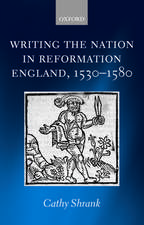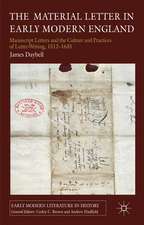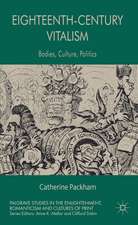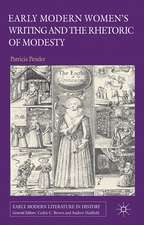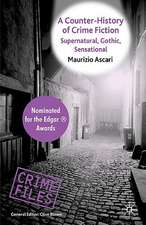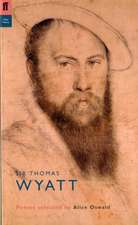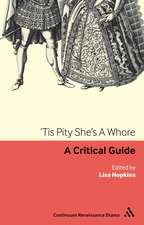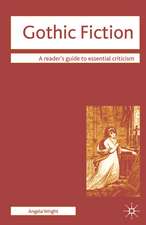Transversal Enterprises in the Drama of Shakespeare and his Contemporaries: Fugitive Explorations
Autor B. Reynoldsen Limba Engleză Paperback – mar 2006
| Toate formatele și edițiile | Preț | Express |
|---|---|---|
| Paperback (1) | 385.84 lei 6-8 săpt. | |
| Palgrave Macmillan UK – mar 2006 | 385.84 lei 6-8 săpt. | |
| Hardback (1) | 391.99 lei 6-8 săpt. | |
| Palgrave Macmillan UK – mar 2006 | 391.99 lei 6-8 săpt. |
Preț: 385.84 lei
Nou
Puncte Express: 579
Preț estimativ în valută:
73.83€ • 77.29$ • 61.09£
73.83€ • 77.29$ • 61.09£
Carte tipărită la comandă
Livrare economică 05-19 aprilie
Preluare comenzi: 021 569.72.76
Specificații
ISBN-13: 9780230213128
ISBN-10: 023021312X
Pagini: 271
Ilustrații: XI, 271 p.
Dimensiuni: 140 x 216 x 15 mm
Greutate: 0.36 kg
Ediția:2006
Editura: Palgrave Macmillan UK
Colecția Palgrave Macmillan
Locul publicării:London, United Kingdom
ISBN-10: 023021312X
Pagini: 271
Ilustrații: XI, 271 p.
Dimensiuni: 140 x 216 x 15 mm
Greutate: 0.36 kg
Ediția:2006
Editura: Palgrave Macmillan UK
Colecția Palgrave Macmillan
Locul publicării:London, United Kingdom
Cuprins
List of Figures Acknowledgements Transversal Poetics and Fugitive Explorations: Theaterspace, Paused Consciousness, Subjunctivity, and Macbeth ; B.Reynolds The Reckoning of Moll Cutpurse: Transversal Reimaginings of The Roaring Girl ; B.Reynolds & J.Segal The Delusion of Critique: Subjunctive Space, Transversality, and the Conceit of Deceit in Hamlet; A.Kubiak & B.Reynolds Comedic Law: Projective Transversality, Deceit Conceits, and the Conjuring of Macbeth and Doctor Faustus in Jonson's The Devil is an Ass ; A.Cook & B.Reynolds I Might Like You Better if We Slept Together: The Historical Drift of Place in The Changeling ; D.Hedrick & B.Reynolds Fugitive Explorations in Romeo and Juliet : Searching for Transversality inside the Goldmine of R&Jspace; B.Reynolds & J.Segal Viewing Antitheatricality: or, Tamburlaine's Post-Theatrics; B.Reynolds & A.Thompson Becomings Roman/Comings-to-be Villain: Pressurized Belongings and the Coding of Ethnicity, Religion, and Nationality in Peele and Shakespeare's Titus Andronicus ; G.Odom & B.Reynolds Awakening the Werewolf Within: Self-help, Vanishing Mediation, and Transversality in The Duchess of Malfi ; C.Lehmann & B.Reynolds Performative Transversations: Collaborations Through and Beyond Green's Friar Bacon and Friar Bungay ; B.Reynolds & H.S.Turner Afterword: Re: conaissance; B.Smith A Very Short List of Writings Significant to the Developmental of Transversal Poetics Notes on the Collaborators Index Index
Recenzii
'An original social theory and research methodology that draws on cultural anthropology, cognitive science, and physics as well as phenomenology and materialism, 'transversal poetics' is Bryan Reynolds' brilliant response to the need for more politically charged, inclusive, and witty critical inquiry. This book will not only be enormously valuable to students and scholars of early modern English theatre and culture, but it will also be one with which future scholarship in these fields will have to contend.' - Patrice Pavis, Professor of Theatre, University of Paris VIII-Saint-Denis, France
'Bryan Reynolds and his collaborators have produced an ambitious and energetic reformulation of the relations between culture and politics. This lively and accessible book offers 'transversalism' as a nuanced and responsive key to the interpretation of literary texts.' - Professor Alan Sinfield, University of Sussex, UK
'The transversal Shakespeare is the endlessly galvanizing Shakespeare, always offering new resources for individual agency and cultural transformation. Transversal Enterprises in the Drama of Shakespeare and His Contemporaries is driven by the determination of Bryan Reynolds and his collaborators to breathe new life into the Shakespeare criticism of our time. They incorporate and transform the critical theory we have inherited while expanding the frame to include new developments in performance theory, historical criticism, and the 'genetics' of culture. Eclectic, synthetic, and free-wheeling rather than monolithic, the book provocatively deploys its own 'transversal' vocabulary while challenging us to read afresh - and respond energetically - at every turn. Love it or hate it, this is a 'next generation' book.' - Professor Jonathan Crewe, Dartmouth University, USA
'The book offers a valuable language of analysis and argument for so many different fields of study-but perhaps most pointedly to those interested in the question of adaptation, or in how texts accrete significance as they travel or are successively performed (in all senses).' - Dr. Julian Yates, University of Delaware, USA
'...one of the most sophisticated and important theoretical treatments of early modern literature that has emerged since the decline of New Historicism.' - Paul Cefalu, Shakespeare Quarterly
'...a brilliant book, used by scholars and being read in graduate theatre theory and Jacobean drama courses everywhere... Bryan Reynolds has a new, if I might even say, American theory, which endorses potential.' - Professor Marianne McDonald, University of California, San Diego, USA
'This book is a stimulating intervention into theoretical debates on Shakespeare. It is provocative, theoretically daring and critically adventurous. Reynolds and his collaborators write about Shakespeare and theory in ways which will create heated debates in conferences and postgraduate seminars and will fuel undergraduate students' critical imaginations. Essays on topics such as the 'werewolf within' and 'R&J Space' will engage students by showing them how critical approaches to Shakespeare's work can be both contemporary and creative. This book will be essential reading for anyone interested in theorising the work of Shakespeare and his contemporaries in performance.' - Professor Stuart Hampton-Reeves, University of Central Lancashire, UK
'...a virtual amusement park of intellectual excitement. Even though clearly developed themes (consciousness, phenomenology, accountability, space) weave the book together, each chapter offers a separate experience, a distinct ride into some other uncharted region of early modern English history.' - Professor Mihaela Irimia, University of Bucharest, Romania
'Witty, lively and original in conception and execution, Bryan Reynolds and his co-authors have reanimated canonical Shakespearean and Renaissance drama by reading them uncannily in relation both to the more familiar critical practices of historicism and psychoanalysis and the stranger practices of neuroscience, memetics and primatology. Perhaps the most exciting achievement of the book lies in the varied ways its collaborating authors have transformed their writing as well as the field of Shakespeare and Renaissance studies.' - Professor Richard Burt, University of Florida, USA
'Authorities beware! Bryan Reynolds and his co-conspirators are on the loose again... Armed with a new critical approach called transversal poetics complete with a lexical arsenal developed by Reynolds himself, these fugitive explorers are bent on discovering and exposing the nooks and crannies of poststructuralist theory, cultural studies, performance theory, audience response theory and a host of other established fields. Radical in their desire to unite text-centred approaches such as deconstruction with recent innovations in historicist fields such as cultural studies, Reynolds and his space invaders have found new ways to investigate resistance to authority in a variety of early modern texts and artifacts... This book provides a relevant and accessible introduction to a new field in critical theory for undergraduates, and it also offers ammunition for more advanced scholars interested in attempting to take on or take down established paradigms in early modern literary and cultural studies.' - Professor Adam Max Cohen, University of Massachusetts, Dartmouth, USA
'All of these essays are important in their own right, and this book is surely destined to become one of the canonical works of early modern literary criticism...this is a highly significant book. Some reviewers of Reynolds's earlier work have accused him of reveling in jargon, and it is true that he takes delight in neologism; but Reynolds's work makes explicit certain tendencies long latent within cultural materialism, and draws out the hidden implications of materialist theories of subjectivity. It should berequired, salutary reading for aspiring critics of the humanities.' - David Hawkes,
Theatre Survey
Most recently, in the wake of New Historicism and a series of posts (most notably poststructuralism and postcolonialism), while we were waiting for the next big thing, Transversal Poetics took the stage. Notwithstanding the daunting name, this approach does help to expand and enrich the contexts for investigating what makes Elizabethan drama still so compelling. Collaboratively pioneered by Bryan Reynolds (head of Ph.D. studies in drama at the University of California, Irvine), a coterie of graduate students from Irvine and San Diego, and a handful of like-minded English professors, Transversal Poetics is, in the parlance of the trade, gaining traction. . . . Whether or not one wishes to stake a transversal claim of one's own, this book presents a lively and viable account of what is happening in social and dramatic performance studies today. - William E. Engel, Sewanee Review
'Bryan Reynolds and his collaborators have produced an ambitious and energetic reformulation of the relations between culture and politics. This lively and accessible book offers 'transversalism' as a nuanced and responsive key to the interpretation of literary texts.' - Professor Alan Sinfield, University of Sussex, UK
'The transversal Shakespeare is the endlessly galvanizing Shakespeare, always offering new resources for individual agency and cultural transformation. Transversal Enterprises in the Drama of Shakespeare and His Contemporaries is driven by the determination of Bryan Reynolds and his collaborators to breathe new life into the Shakespeare criticism of our time. They incorporate and transform the critical theory we have inherited while expanding the frame to include new developments in performance theory, historical criticism, and the 'genetics' of culture. Eclectic, synthetic, and free-wheeling rather than monolithic, the book provocatively deploys its own 'transversal' vocabulary while challenging us to read afresh - and respond energetically - at every turn. Love it or hate it, this is a 'next generation' book.' - Professor Jonathan Crewe, Dartmouth University, USA
'The book offers a valuable language of analysis and argument for so many different fields of study-but perhaps most pointedly to those interested in the question of adaptation, or in how texts accrete significance as they travel or are successively performed (in all senses).' - Dr. Julian Yates, University of Delaware, USA
'...one of the most sophisticated and important theoretical treatments of early modern literature that has emerged since the decline of New Historicism.' - Paul Cefalu, Shakespeare Quarterly
'...a brilliant book, used by scholars and being read in graduate theatre theory and Jacobean drama courses everywhere... Bryan Reynolds has a new, if I might even say, American theory, which endorses potential.' - Professor Marianne McDonald, University of California, San Diego, USA
'This book is a stimulating intervention into theoretical debates on Shakespeare. It is provocative, theoretically daring and critically adventurous. Reynolds and his collaborators write about Shakespeare and theory in ways which will create heated debates in conferences and postgraduate seminars and will fuel undergraduate students' critical imaginations. Essays on topics such as the 'werewolf within' and 'R&J Space' will engage students by showing them how critical approaches to Shakespeare's work can be both contemporary and creative. This book will be essential reading for anyone interested in theorising the work of Shakespeare and his contemporaries in performance.' - Professor Stuart Hampton-Reeves, University of Central Lancashire, UK
'...a virtual amusement park of intellectual excitement. Even though clearly developed themes (consciousness, phenomenology, accountability, space) weave the book together, each chapter offers a separate experience, a distinct ride into some other uncharted region of early modern English history.' - Professor Mihaela Irimia, University of Bucharest, Romania
'Witty, lively and original in conception and execution, Bryan Reynolds and his co-authors have reanimated canonical Shakespearean and Renaissance drama by reading them uncannily in relation both to the more familiar critical practices of historicism and psychoanalysis and the stranger practices of neuroscience, memetics and primatology. Perhaps the most exciting achievement of the book lies in the varied ways its collaborating authors have transformed their writing as well as the field of Shakespeare and Renaissance studies.' - Professor Richard Burt, University of Florida, USA
'Authorities beware! Bryan Reynolds and his co-conspirators are on the loose again... Armed with a new critical approach called transversal poetics complete with a lexical arsenal developed by Reynolds himself, these fugitive explorers are bent on discovering and exposing the nooks and crannies of poststructuralist theory, cultural studies, performance theory, audience response theory and a host of other established fields. Radical in their desire to unite text-centred approaches such as deconstruction with recent innovations in historicist fields such as cultural studies, Reynolds and his space invaders have found new ways to investigate resistance to authority in a variety of early modern texts and artifacts... This book provides a relevant and accessible introduction to a new field in critical theory for undergraduates, and it also offers ammunition for more advanced scholars interested in attempting to take on or take down established paradigms in early modern literary and cultural studies.' - Professor Adam Max Cohen, University of Massachusetts, Dartmouth, USA
'All of these essays are important in their own right, and this book is surely destined to become one of the canonical works of early modern literary criticism...this is a highly significant book. Some reviewers of Reynolds's earlier work have accused him of reveling in jargon, and it is true that he takes delight in neologism; but Reynolds's work makes explicit certain tendencies long latent within cultural materialism, and draws out the hidden implications of materialist theories of subjectivity. It should berequired, salutary reading for aspiring critics of the humanities.' - David Hawkes,
Theatre Survey
Most recently, in the wake of New Historicism and a series of posts (most notably poststructuralism and postcolonialism), while we were waiting for the next big thing, Transversal Poetics took the stage. Notwithstanding the daunting name, this approach does help to expand and enrich the contexts for investigating what makes Elizabethan drama still so compelling. Collaboratively pioneered by Bryan Reynolds (head of Ph.D. studies in drama at the University of California, Irvine), a coterie of graduate students from Irvine and San Diego, and a handful of like-minded English professors, Transversal Poetics is, in the parlance of the trade, gaining traction. . . . Whether or not one wishes to stake a transversal claim of one's own, this book presents a lively and viable account of what is happening in social and dramatic performance studies today. - William E. Engel, Sewanee Review
Notă biografică
AMY COOK Associate Instructor and Doctoral Student in the UCI/UCSD Joint PhD Programme in Drama and Theatre DONALD HEDRICK Professor of English at Kansas State University, USAANTHONY KUBIAK Professor of Drama at the University of California, Irvine, USACOURTNEY LEHMANN Associate Professor of English and Film Studies at the University of the Pacific, California, USA and Director of the Pacific Humanities Centre, USAGLEN ODOM Associate Instructor and Doctoral Student in Comparative Literature at the University of California, Irvine, USAJANNA SEGAL Associate Instructor and Doctoral Student in the UCI/UCSD Joint PhD Programme in Drama and TheatreBRUCE SMITH College Professor of English at the University of Southern California, USAAYANNA THOMPSON Assistant Professor in the Department of English at Arizona State University, USAHENRY S. TURNER Assistant Professor in the English Department at the University of Wisconsin, USA


